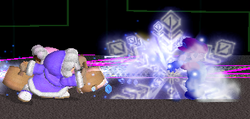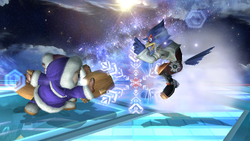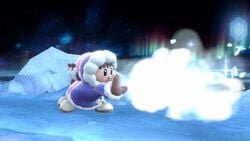Freezing
- Not to be confused with the freeze glitch. For game freezing, see game crash.



Freezing, also known as ice, is an attack effect in the Super Smash Bros. series, which debuted in Super Smash Bros. Melee and has appeared in every subsequent game. It causes a character to be encased in ice while taking knockback, preventing them from taking action for a certain amount of time in replacement of the hitstun they would usually experience.
Freezing attacks are boosted by Freezing Attack stickers in Super Smash Bros. Brawl's The Subspace Emissary and the support spirit skill Water & Ice Attack ↑, as well as certain Spirit Battle conditions in Super Smash Bros. Ultimate. In Ultimate, the spirit skill or trait Water/Freezing Resist ↑ weakens freezing attacks. The support spirit skill Ice-Floor Immunity prevents the equipped fighter from being frozen or being damaged by Spirit Battle ice floors, but does not affect the damage the player takes from freezing attacks.
General properties
In all games, a freezing attack needs to inflict knockback of at least 52.5 units to freeze the target, which matches the minimum knockback required to trigger their heavy flinching animation. When a character gets frozen, their knockback is calculated as usual, but they decelerate slower as they fly away (with a launch speed decay of 0.03 per frame, down from 0.051), and their falling speed is reduced (by 0.7× from Brawl onward), giving them significantly floatier physics and causing them to cover a longer distance. While frozen, characters also take 0.5× damage and 0.25× knockback from subsequent attacks, hindering the effectiveness of KO setups against frozen opponents, with even powerful meteor smashes dealing negligible knockback. Frozen characters cannot be grabbed.
In Melee, being hit by a freezing attack causes a variation of the ping sound to play; only those that deal high enough knockback, such as the Freezie and Articuno's attack, use the actual ping sound. From Brawl onward, freezing attacks use their own sound effects, with the exception of Mr. Game & Watch's Judge #8.
Freeze time
The amount of frames characters are frozen for is determined differently across games, though in all of them, the damage inflicted by the freezing attack is a factor, and it is altered by both button mashing from the victim's part and dealing damage to them while frozen. Additionally, remaining freeze time will begin decaying immediately, even during hitlag, meaning that non-projectile ice attacks effectively have a lower frame advantage. In Melee, the formula for the initial freeze time is damage * 12.5, rounded down; button mashing reduces it by 3 frames per input, and attacks reduce it by 0.75× of the damage they would deal to a non-frozen opponent, even if the attack has a freezing effect. In Brawl and Smash 4, freeze time is reduced overall; the formula is changed to damage * 12 rounded down, and button mashing reduces freeze time by 4 frames per input (7.2 with buttons in Smash 4, though they cannot be inputted as quickly as stick inputs), while attacks reduce it by 2× of the damage they would deal to a non-frozen opponent. In these three games, hitting a frozen opponent with a flame attack thaws them out immediately.
In Ultimate, freeze time has undergone significant changes. The new formula for the initial freeze time is 5d + 0.5p, rounded down, where d is the damage dealt by the freezing attack, taking the 1v1 multiplier and modifiers such as stale-move negation into account, while p is the target's percent before the attack connects (unlike other status conditions such as burying and sleep, which use the post-hit percent). For example, if a character is hit by a fully charged PK Freeze (which deals 23% damage) at 25%, they are initially frozen for 150 frames in a 1v1, and 127 frames in battles with more players. Additionally, freezing now has a maximum duration of 250 frames. Button mashing still reduces freeze time by 4 frames per input (7.2 with buttons), but attacking frozen opponents has considerably different effects depending on the kind of attack used:
- If the attack has a freezing effect, it adds 0.67× of the initial freeze time it would otherwise inflict.
- If the attack has neither a flame nor freezing effect, it adds freeze time equal to
0.38p - d/4, with p and d working the same as in the standard formula. As a result, attacking frozen opponents increases their freeze time instead of decreasing it like in previous games, although more damaging attacks counterintuitively add less freeze time at the same percents as less damaging ones. - If the attack has a flame effect, it sets the freeze time to
0.38p + 1.38d, regardless of the remaining amount at the time of the hit. This generally causes the opponent to thaw out quicker, but still has the counterintuitive effects of being less effective the sooner they are to thawing out, and more damaging flame attacks being less effective for reducing the freeze time.- All these increases to freeze time still abide by the 250-frame cap, and can only be done up to 5 times until the opponent thaws out.
Uniquely, Hero's Kacrackle Slash applies a 2× multiplier to the initial freeze time, giving him a greater advantage over the opponent compared to other freezing attacks. Furthermore, multi-hit freezing attacks (namely the Ice Climbers' Blizzard) have a new accumulation mechanic that lets them freeze opponents even if they deal less than 52.5 units of knockback. More specifically, each hit's resulting freeze time from the formula (if they would have caused freezing) is added together if the target is kept in hitstun between them, and if the combined value exceeds 263, the opponent is frozen by the hit to have crossed the threshold, using its individual freeze time. For example, in a 1v1 match with stale-move negation disabled, Blizzard can freeze as early as 28.4% with 9 hits; if there is no percent increase between hits (such as by the Fixed Damage option in Training mode), this instead happens at around 37%, which can be verified by the result of (5 * 2.16 + 0.5 * 37) * 9 exceeding 263. As this only takes damage into account, it works regardless of the opponent's weight or knockback modifiers, unless they take no hitstun as a result of either armor or the attack dealing flinchless knockback.
In all games, a frozen character automatically jumps after thawing out, canceling out most of their remaining launch speed, and can perform other actions immediately (except in Melee, where they sustain 16 frames of ending lag), though their horizontal momentum is still temporarily locked. Additionally, they are protected from subsequent freezing attempts for 60 frames after thawing out.
Overall, freezing is unreliable for conventional combos and KO setups compared to other status conditions, due to the opponent's greatly reduced damage and knockback taken during it, as well as lacking any frame advantage when they thaw out. However, it can still be a useful way to build damage, due to button mashing's relatively weak effect on it causing characters to usually remain frozen for a prolonged amount of time. In Ultimate, Lucas' PK Freeze is also notorious for launching at a low angle that is strengthened in effectiveness by its freezing effect, causing characters to fly much farther than usual due to their combination of reduced launch speed decay and longer immobile time, which makes it an excellent edgeguarding and horizontal KO option.
The Subspace Emissary
Freezing is one of the more useful effects in The Subspace Emissary: it deals extra damage to flame-based enemies and about half of the bosses, and is only specifically resisted by Glices. However, it cannot cause non-fighter enemies to freeze, and attacks with the freezing effect are rare and almost exclusively indirect, which most enemies and bosses resist; Judge is the only non-indirect freezing attack available in The Subspace Emissary, and it can only be used at random.
List of freezing attacks
By characters
| Character | Move(s) | Games |
|---|---|---|
| Giga Bowser | Down smash | |
| Hero | Command Selection (Kacrackle Slash) | |
| Ice Climbers | Ice Shot | |
| Blizzard | ||
| Iceberg | ||
| Kirby | Ice Breath | |
| Kirby (Copy Abilities) | Ice Shot | |
| PK Freeze | ||
| Magic (Blizzaga) | ||
| Lucas | PK Freeze | |
| Luigi | Ice Ball | |
| Mega Man | Ice Slasher | |
| Mr. Game & Watch | Judge (number 8) | |
| Ness | PK Freeze (custom PK Flash) | |
| Sora | Magic (Blizzaga) |
By items
| Character | Move(s) | Games |
|---|---|---|
| Assist Trophies | Krystal: Ice Blast | |
| Riki: Freezinate | ||
| Wily Capsule: Ice projectiles | ||
| Freezie | Thrown Freezie | |
| Attacking a Freezie | ||
| Poké Ball Pokémon | Abomasnow: Ice Punch | |
| Abomasnow: Blizzard | ||
| Alolan Vulpix: Icy Wind | ||
| Articuno: Icy Wind | ||
| Ditto: Transform (if the summoner possesses freezing attacks) | ||
| Kyurem: Icy Wind | ||
| Suicune: Blizzard | ||
| Suicune: Contact with head before attacking | ||
| Suicune: Aurora Beam | ||
| Togepi: Powder Snow |
By enemies and bosses
| Enemy/Boss | Attack(s) | Games |
|---|---|---|
| Blue Bubble | Ramming into the player | |
| Crazy Hand | Tri-Poke (third hit) | |
| Frozen Rope | ||
| Cryogonal | Ice Beam | |
| Giga Bowser | Down smash | |
| Glice | Ice attack | |
| Marx | Ice balls | |
| Master Hand | Icy Wind |
By stage hazards
In addition to natural stage hazards, the Spirit Battle condition "The floor is frozen" creates a hazard that inflicts freezing damage.
| Stage | Hazard | Games |
|---|---|---|
| Gerudo Valley | Kotake's ice spell | |
| Mushroom Kingdom U | Falling Icicles |
Trivia
- According to the official Japanese Super Smash Bros. minisite, an "ice" effect was originally planned for inclusion in Super Smash Bros., but was ultimately not used.
- In Stamina mode, characters KO'd by freezing attacks cannot thaw out unless they are hit by a flame attack. In Ultimate, this does not seem to delay the defeated character's self-destruction.
| List of attack effects | |
|---|---|
| Introduced in Super Smash Bros. | Normal |
| Introduced in Super Smash Bros. Melee | Bury |
| Introduced in Super Smash Bros. Brawl | Aura |
| Introduced in Super Smash Bros. 4 | Blaster |
| Introduced in Super Smash Bros. Ultimate | Autoreticle |
